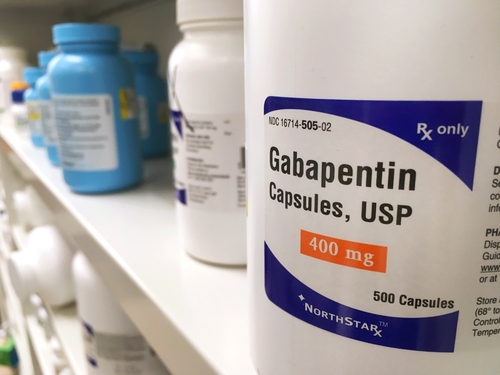
Gabapentin, also known by its brand name as Neurontin, is an anticonvulsant, prescription painkiller. The United States Food and Drug Administration (FDA) approved the use of gabapentin for the treatment of epileptic disorders and neuropathic pain. Medical News Today explains that Gabapentin works “altering electrical activity in the brain and influencing the activity of chemicals called neurotransmitters, which send messages between nerve cells.” It is a relatively new medication, as Neurontin was introduced in 1993 and its generic version (gabapentin) was introduced in 2004. Currently, gabapentin is most frequently prescribed as treatment for epilepsy, restless leg syndrome, fibromyalgia, seizures, neuropathic pain, and/ or hot flashes. It is also used to help treat nerve pain and discomforts associated with cocaine and/ or alcohol withdrawal symptoms. The average half-life, meaning the length of time the substance will remain in one’s system until the concentration in one’s blood has been reduced by half, of gabapentin ranges from five to eight hours.
Side Effects
As is true when taking any type of medication, there are always associated risks and potential unwanted side effects. The Mayo Clinic provides examples of side effects that could present when taking gabapentin, some of which include the following:
- Unsteadiness
- Clumsiness
- Anxiety
- Chest pain
- Chills
- Depression
- Fever
- Swollen glands
- Hyperactivity
- Concentration problems
- Aggression
- Rapidly changing moods
- Loss of memory
- Sore throat
- Joint pain
- Diarrhea
An individual that habitually abuses gabapentin will build a tolerance to the abused substance, which means he or she must increase the dose and/ or frequency of gabapentin use to achieve the same effects. The longer an individual abuses gabapentin the more his or her brain relies on functioning with it present in his or her system, and the greater the likelihood he or she will experience withdrawal symptoms when they attempt to come off it. Common examples of withdrawal symptoms could include, but are not limited to the following:
- Insomnia
- Fatigue
- Anxiety
- Agitation
- Headache
- Sweating
- Sensitivity to light
- Dizziness
- Irregular heartbeat
- Nausea
- Pain
American Addiction Centers asserts that withdrawal symptoms “can begin within 12 hours to 7 days after quitting the medication and last up to 10 days.” Every person is different and therefore, the length of time it will take an individual to recover from the effects of gabapentin is variable.
For Information and Support
Substance abuse and addiction can be incredibly dangerous and can result in severe short and long-term consequences. If you or someone you know is suffering from substance abuse or addiction, please get help as soon as possible. The earlier you seek support, the sooner you and your loved ones can return to leading happy, healthy, and fulfilling lives. There is no reason to go through this alone, and we are here to help. Please feel free to reach out to us for further information or with any questions regarding substance abuse or addiction. We are available anytime via telephone at: 213-389-9964, or you can always email us at: info@friendlyhousela.org.





